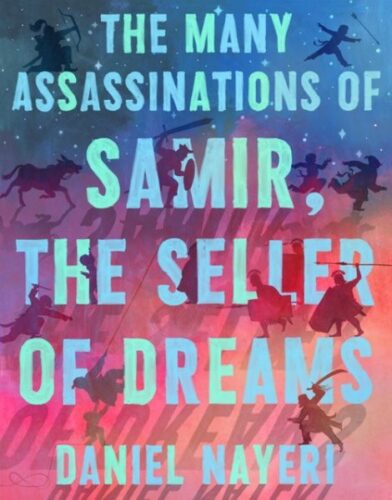Review of the Day: The Many Assassinations of Samir, the Seller of Dreams by Daniel Nayeri, ill. Daniel Miyares

The Many Assassinations of Samir, the Seller of Dreams
By Daniel Nayeri
Illustrated by Daniel Miyares
$21.99
ISBN: 9781646143030
Ages 10 and up
On shelves March 7th
Come over here. I want to walk you through a first sentence.
You know, they often say that the first sentence of a book should really be a doozy and grab the reader’s attention, but most of the time authors sort of dash it off. They prefer to make the first page or the first chapter momentous and memorable, and I understand the instinct. Still, I’ve always carried a soft spot in my heart for those writers that really dig in and try to make Sentence #1 the place where the fireworks reside. Consider now the opening sentence of The Many Assassinations of Samir, the Seller of Dreams: “The first time I was stoned to death by an angry mob, I was not even a criminal.” Let’s just pause and sit for a moment and take in why this sentence is so good. Pick it apart even:
“The first time” = There will be at least a second time.
“stoned to death by an angry mob” = instant excitement.
“I was not even a criminal” = the suggestion, however slightly, that in time this narrator would become a criminal.
ADVERTISEMENT
ADVERTISEMENT
Oh, what a piece of work is this sentence. And little wonder too, since it hails from the general vicinity of the tongue of Daniel Nayeri. Folks, I’m not going to sit before you and tell you that this middle grade novel is a perfect object, whole and without flaw. What I will tell you is that it will charm you, lure you, frustrate you, confound you, and generally wrap you up in its messy understanding of what happens when storytelling meets historical supposition. Nothing about this novel is wholly ideal except possibly its intentions and its ability to charm some readers into a general state of submission. The question now is: Are you such a reader?
Monkey is having a bad day. The monks, with whom he has lived with ever since his past guardians died, are currently in the process of stoning him to death for blasphemy. He is saved, ultimately, by the hand of a mustached merchant named Samir, to whom he is now indebted. The problem? Samir has a bit of a habit of stretching the truth. So much so that soon thereafter Monkey (as Samir dubs the kid) discovers that seven hired assassins are gunning for Samir’s life. If Monkey is to pay back his debt to Samir of six bolts of silk, then he’s going to have to save his life multiple times. But is Samir the rogue he appears to be, or is there something more at work? Set along the Silk Road in the eleventh century, Nayeri’s story whisks you back in time to an era of warlords, thieves, merchants and scholars.
Now we come to the nut of the matter: audience. I don’t usually introduce this element of a book this early in a review, but I find myself hamstrung and forced to do so today. What age range, precisely, is this book being written for? At times, it has a downright adult sensibility. Other times it’s dealing in philosophical ideals better suited to a YA novel. And yet with the art of Daniel Miyares (doing a killer job, I might add, no pun intended) and the central plot of multiple assassins, there’s definitely a kid-friendly feel to much of it. You know, some books are marketed to different age levels, depending on the country. So a title like The Book Thief might be marketed to children in one nation and adults in another. The Many Assassinations of Samir, the Seller of Dreams feels exactly like a book that would fall into this rarified category. This is not to say that a highly intelligent child wouldn’t get something out of it. Just that there are swaths of this story that will inevitably go over their heads. That’s not the worst thing in the world, but it does make it a little hard to categorize.
So for the sake of argument, let’s have fun and put the idea of age range completely to the side for the rest of this review. I mean, why not? If you’ve a kid that gets squeamish when it comes to physical attacks on the page then I can tell you right now that this book is not for them. For the kid inured to it, for good or for ill, we press on. As I’ve mentioned before, the bulk of the book is pretty great for kids that demand action. You’ve got that slambang opening of a boy running for his life, then a bit of downtime, and then the fact that there are multiple assassins gunning for Samir to pick up the pace once again. There are some distinctly philosophical discussions in the midst of all this (if you’ve ever craved a novel to dive into the nature of Accidentalism, you have just hit the jackpot, my friend) and some of Samir’s clever twists of the tongue tie up the reader as efficiently as his customers/antagonists, so a certain level of patience is required in all of this. Still, there’s a reason to press on: Daniel Nayeri has a gift.
Nayeri’s saving grace, the thing that makes him so similar to Samir (and, perhaps, his storytelling father as well) is his ability to string words together in an exceedingly alluring way. I haven’t done this in a review for a while, but I’m inclined to just pull out random quotes from this text because I like them. Like so:
– “The head monk made his answer silence – the executioner’s melody.”
– “We were almost nose-to-nose. Hers was the most elegant, porcelain thing I have ever seen. Under it were lips. Above it were eyes. Her face seemed to float in a cloud of unknowing. I am still in that yurt, any time I sleep, all this time later.”
– “But let this be a lesson: To everyone we love we give a knife. The knife is shaped to pass through the bones of our chests like a key in a lock. Nothing else can cut our hearts so deeply.”
– “For a short second, I wondered if Samir had ever been a father. I wondered if the reason he loved kids was because his heart had already built a room for them.”
– “The problem with tricksters is that they think everyone is playing the same games.”
ADVERTISEMENT
ADVERTISEMENT
When did I come to fall in love with the book? That’s a difficult question to answer. I suppose it was around the point when I came to realize what a stand up and cheer kind of guy Samir was. I mean, let’s step back for a second and take our narrator, Monkey, into account. You know how some people keep track of the books that they read on Goodreads and give their books little categories? One of my categories is “Unreliable Narrators” and you can BET that Monkey is going to find himself slotted into that space. Why? Because here we have a kid raised by monks who spends a goodly chunk of this book sitting in judgement of a lot of the other characters, particularly Samir. Never mind that the man gives him all the freedom he could possibly need. Monkey feels he’s beholden to Samir because he has to feel beholden to someone. Even so, author Daniel Nayeri has this way of giving Monkey the ability to both faithfully relay Samir’s multiple kindnesses to others, while still standing in judgement of him and finding fault every which way. After a while this narrating begins to sound like that of a sulky teenager discussing how uncool their parental figure is. Even the densest reader will, in time, be able to parse Monkey’s dismissals from the truly good work Samir does others every step of the way.
Monkey’s moments of clarity make him far more interesting than your average narrator. At one point he bemoans the fact that every time he saves Samir’s life, he finds that his debt, the six bolts of cloth Samir traded for him, have only been reduced by a single bolt. “And yet, when I looked at him – a failure of a man by any measure – I thought maybe that’s how little he valued himself. Maybe he wasn’t cheating me of anything, but simply setting a price on each of our lives. I don’t know. He loved himself and hated himself too much at the same time.” And just as Monkey grinds his way towards understanding, so too do we. Kids are naturally inclined to trust their narrators, so it would be interesting to do this in a book discussion group with a bunch of them. When did they begin to realize that Monkey p.o.v. wasn’t wholly reliable? When did they figure out that Samir’s ultimate plan, such as it is, seems to be to delay Monkey long enough into loving him? Can you delay someone into affection? Would love to hear some answers to that one.
Not to state the obvious, but there are similarities here to Don Quixote that are unavoidable. Many times it feels as if Monkey is a Sancho Panza, struggling along behind his errant knight of a master. Nowhere is this clearer than when Samir launches into a litany of praises for his own decrepit donkey, Rostam. “He’s the donkey patriarch, the people’s hero, a creature who casts a greater shadow than the divine tianma horses, a sire to Pegasus, and a ruby-sweating god-beast.” May we all have someone who loves us so much in our lives that they declare us a “ruby-sweating god-beast” in public.
Monkey is frustrated, continually, with Samir. And I, an adult reader of what is ostensibly a children’s book, am frustrated by The Many Assassinations of Samir, the Seller of Dreams. But you know what? I’m not going to forget this book. I may want to pinch it into a new shape, and redirect it accordingly, but will I ever get that scene with the ablutionist out of my head? Or the fight on the bridge? I can still see with complete clarity the encounter with the Bezerker in the marketplace. I mean, the action scenes in this book are better than any Mission Impossible film you could name. The child that reads this will not forget it, and how many books that come out for this age range can say the same? Deeply annoying and engrossing and charming and odd, does this book, with its little Blue Velvet moments and strange Hail Mary passes that land 65% of the time, have an equal? Is there anything else out there like it? I will simply say this: If you hand this book to someone, they will definitely have an opinion of it. You may, in fact, end up loving it in the end, or cursing it to the heavens. A tome with a soul tied inextricably to that of its titular character. Better read it.
On shelves March 7th.
Source: Galley acquired at ALA conference for review.
Filed under: Best Books, Best Books of 2023, Reviews, Reviews 2023
About Betsy Bird
Betsy Bird is currently the Collection Development Manager of the Evanston Public Library system and a former Materials Specialist for New York Public Library. She has served on Newbery, written for Horn Book, and has done other lovely little things that she'd love to tell you about but that she's sure you'd find more interesting to hear of in person. Her opinions are her own and do not reflect those of EPL, SLJ, or any of the other acronyms you might be able to name. Follow her on Twitter: @fuseeight.
ADVERTISEMENT
ADVERTISEMENT
SLJ Blog Network
One Star Review, Guess Who? (#202)
Exclusive: Giant Magical Otters Invade New Hex Vet Graphic Novel | News
Parsing Religion in Public Schools
Take Five: LGBTQIA+ Middle Grade Novels
ADVERTISEMENT








I’m not completely convinced . . . you know the “too many books too little time” thing but you sure do know how to write a review. Perhaps I’ll never read this one BUT I fully intend to savor this review of it at least one more time!
Have a wonderful weekend and thanks as always.
I just finished listening to it and can’t stop talking about it. And then the hardcopy came across my desk (waiting for 3/7, of course). The pictures really through me for a loop. I was all prepared to recommend it for older kids (grades 6-8, I thought) and now I’m just utterly confused.
See, I haven’t seen the images at all, so I’ve no idea what they look like.
To the library!